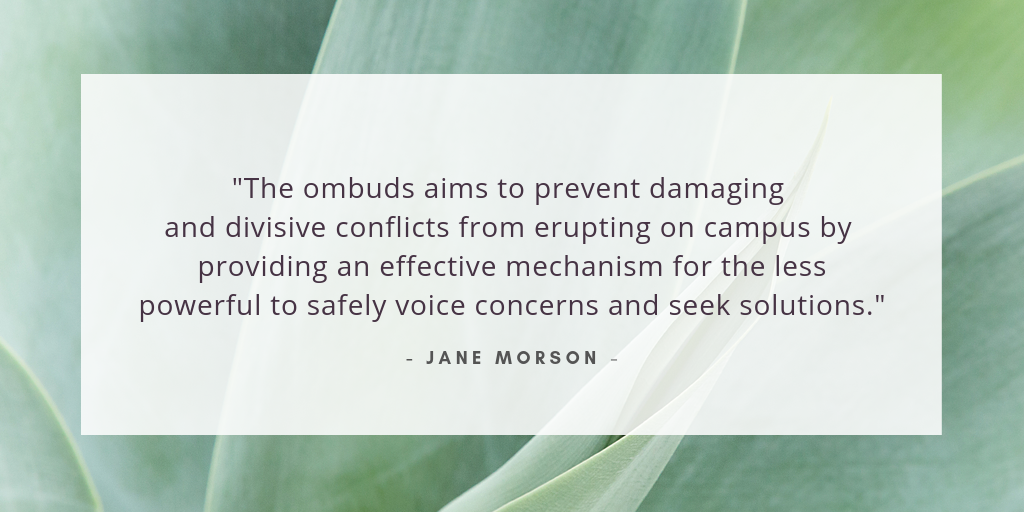There are many things to love about being a higher education professional.
Yet, whether they are industry-wide struggles or campus-specific issues, many people agree it’s not always easy to be an #SAPro. Is there someone you can turn to when you need help navigating challenging situations? Is there a lifeline?!

There is, and they’re an ally you probably don’t know you have: Your campus ombudsperson.
Who exactly is an ombudsperson? Their education background usually includes a bachelor’s degree in public administration, pre-law, or psychology, and a master’s degree in those or related areas. They may also have work experience in counseling, investigation, or litigation and may hold a ombudsman-related certification.
While ombuds are typically a one-person department on their institution’s campus (more on that later), they aren’t necessarily a lone ranger in their field or without colleagues.
Ombuds have professional associations, including the United States Ombuds Association and International Ombudsman Association (IOA). These offer members a professional community with access to benefits that probably sound familiar, including journal publications, annual conferences, trainings, online resources, and certification programs.
So how does this all add up to this mysterious person being your professional ally? Well, this position was designed to help you navigate sticky situations that may stress you out. Let’s look at why what they do is important and when you might need one.
Your campus ombudsperson is a unique resource because of what they provide. First, their assistance to students, faculty, and/or staff is confidential, impartial, informal, and independent.
This four-part combination, which HigherEdJobs discusses further, can be a lifesaver for professionals who need support. For example, some people may prefer to seek the guidance of their campus ombuds rather than their supervisor or human resources.
The way a campus ombuds delivers help may also be appealing: Services may include conflict coaching, mediation, facilitation, and shuttle diplomacy.
An effective ombuds is able to provide all this through active listening, communicating well with a diverse range of people, and remaining non-judgemental. Their thoughtful yet analytic approach can help people problem-solve and explore resolutions for issues they are facing in work or academia. An ombuds may also refer you to other resources and orient you on what to expect.
While ombuds for communities outside of higher ed may work directly in advocating for individuals or groups, university ombuds are typically organizational ombuds.
A primary duty of an organizational ombuds, according to IOA, is “to work with individuals and groups in an organization to explore and assist them in determining options to help resolve conflicts, problematic issues or concerns.”

An organizational ombuds does not advocate for individuals. Rather, they advocate for fairness and equity across the board from a neutral standpoint. Although this doesn’t mean you can enlist this person to plead your case on your behalf, it does mean you have an ally whose north star can shed light and insight into your best options.
The other services of a campus ombuds provides might be of interest to you as well. They typically provide outreach, workshops, and other programming on topics related to their work. This includes skills like communication, conflict mediation, negotiation, active listening, and more.

A campus ombuds could be an ideal speaker or panel member for your next event, especially since it is an opportunity for them to educate the campus on their role and how they can help the community.
If what an ombuds offers isn’t appealing enough, where their position resides on your campus organizational chart might also be of interest. Ombuds operate independently. This means they are usually an office of one, not housed in HR or a dean’s office. This separation is key to the effectiveness of their work, as it allows them to remain impartial and without biased interests.
In fact, an ombuds typically reports directly to the president or chancellor. What gets shared with that person, you might ask? Simply a general perspective. An ombuds “provides non-identifying feedback to the leadership about trends and systemic problems raised within the campus community.”
The IOA identifies bringing “systemic concerns to the attention of the organization for resolution” as one of the role’s two main duties.
Some campuses have one ombuds for students, one for staff, and one for faculty. Others have a single ombudsperson who serves the entire institution.
The University of South Florida shows us what an ombuds program that’s solely dedicated to students involves. The focus here is on offering support for any student concern or complaint about the institution.
The ombuds can help “clarify policies and procedures, discuss avenues for disputing grades, listen when [students feel they] have been treated unfairly, and help [students] manage challenging relationships with faculty or staff members.”
Georgetown University even has a graduate student ombudsperson.
The University of South Carolina outlines an example of a faculty ombuds service here, noting that this person is not a mandated reporter and that communications to the ombuds are not agents of notice for the university, reinforcing the confidentiality piece of the role.
Faculty ombuds usually also understand the faculty world well. The USC faculty ombuds, for example, who received training from International Ombudsman Association, is a professor emeritus and has had a career in higher education.
Staff may have their own ombuds, as the University of Texas-Austin does. This institution has a staff ombuds but also one for students and one for faculty. All of these, however, are housed on a centralized ombuds homepage for easy navigation for the campus community. A visitor can click on the student, staff, or faculty tab at the top of the page to head to the right place.
Or, your institution could have a single ombuds who serves the entire campus. This may be especially true for smaller schools or newer ombuds programs; however, the value of the ombuds remains the same.
If you didn’t know much about the campus ombuds role before now, you may be thinking this sounds pretty great. You’re right; it is. When do you know when you might need one though?
Broadly, if you’re dealing with difficult people or a difficult situation related to your job, an ombuds can help. Whether you have a good network of professional support and guidance but want an additional perspective, or you’re feeling alone and don’t know where to turn, an ombuds is one of the most overlooked resources on a campus.
Want a more specific breakdown of when you might want to utilize an ombuds? Check out the list below, which includes examples from PeopleMatters, and the ombuds FAQ pages of UT Austin and Boston University:
- You need coaching on ethics, conflict resolution, or management issues.
- You need guidance on how to communicate with someone at the university.
- You need clarification or explanation about a policy and want to seek this privately.
- You need help navigating bureaucracy.
- You need help and are uncomfortable speaking with your supervisor.
- You need help dealing with your supervisor.
- You need help dealing with concerns and complaints you receive.
- You need support dealing with difficult people or a challenging work environment.
- You need insight from an outside, objective, professional perspective.
- You need mediation from a third-party for an intrapersonal conflict.
- You need a confidential safe zone to sort out options on something impacting your job satisfaction or work experience.
- You need to talk about something you feel is unfair, unethical, inequitable, or unsafe in the job place and you’re not sure what to do about it.
- You need help but you don’t know where else to go.
If you’re looking for “the ultimate inside-outsider” to be a resource for you as you face a professional challenge on campus, look no further than your campus ombuds.

An ombuds can make all the difference in your stress level while facing an overwhelming or murky situation. You don’t have to go it alone.
How does your campus talk about or advertise ombuds services? Let us know at @themoderncampus or @PriyaThomas757.





